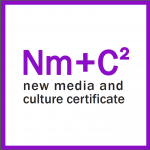 Dr. Tara Fickle is an Assistant Professor in English at the University of Oregon and an affiliated faculty member of the New Media and Culture Certificate. She received her Ph.D. from UCLA in 2014 and, she is interested in many areas of research including Asian and Asian American literature, Game Studies, 20th and 21st century American literature, Ethnic literature, digital humanities, graphic fiction, and children’s literature. She is currently working on her project, American Peril, American Pastime: When Race Becomes Play, which “argues for the centrality of games both literal and metaphorical to minority American literature.”
Dr. Tara Fickle is an Assistant Professor in English at the University of Oregon and an affiliated faculty member of the New Media and Culture Certificate. She received her Ph.D. from UCLA in 2014 and, she is interested in many areas of research including Asian and Asian American literature, Game Studies, 20th and 21st century American literature, Ethnic literature, digital humanities, graphic fiction, and children’s literature. She is currently working on her project, American Peril, American Pastime: When Race Becomes Play, which “argues for the centrality of games both literal and metaphorical to minority American literature.”
Next term, she will be offering a course called New Media & Digital Culture: Games as Theory and Culture through the English Department. The following is a description of the course courtesy of Dr. Fickle:
“Chess. Sudoku. World of Warcraft. Battleship. Candy Crush. Basketball. Roulette. These are all things we call games – but what exactly do they all have in common? This course introduces students to the basics of games as a cultural phenomenon. Beginning with a seemingly obvious question which has frustrated generations of scholars and theorists – what is a game? – we will go on to examine games in terms of function, purpose, mechanics, design, and audience. Students will learn how to talk about games and then how to put that knowledge to work in designing their own games.”
You can also take a look at Dr. Fickle’s “game manual,” a creative alternative to a traditional course syllabus. If her course description alone doesn’t convince you to add the class, the manual will. Included in this manual are a list of achievements (course goals), a guide to getting started (necessary materials for the class), a guide to leveling up (scoring), quest tutorials (assignments), and more. She describes the class further in her opening lines of the introduction,
“In this course, you will have an opportunity to explore some of the most influential ideas and exciting developments of the 20th and 21st centuries related to games of all kinds, from board games to video games to sporting contests and everything in between. In the process, you will develop considerable insight into the nature of games both as important cultural phenomenon and burgeoning economic industry. You may or may not be a gamer or game designer, but you will almost certainly some day have to decide how to transform something “ordinary” — a product, an idea, a task — into an extraordinary, play-worthy experience. This course will help you make those “gamification” decisions wisely. It will also help you understand more about how your own relationship to play, and to work, is intertwined with how you identify yourself (and with others) in terms of culture, nationality, gender, class, and more”
For more information about Dr. Fickle, including a list of courses she has offered, see her personal website.

Interested in being NMCC’s next Prof Pick? Email us!



